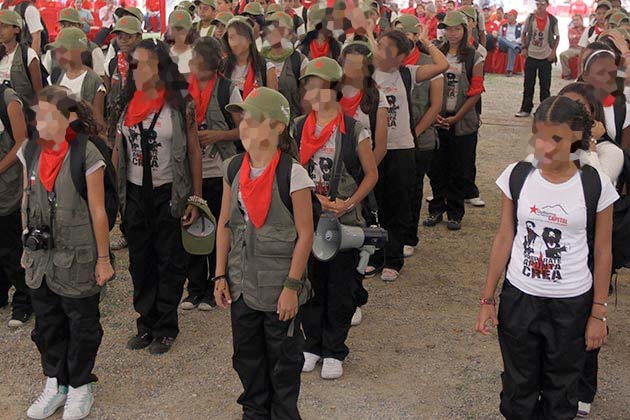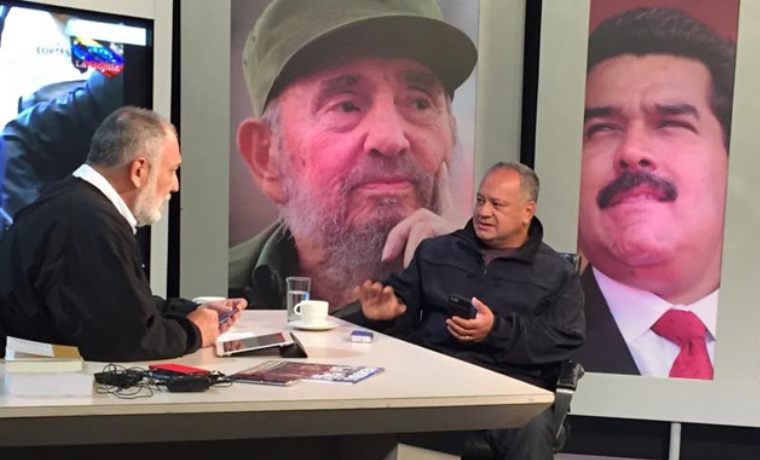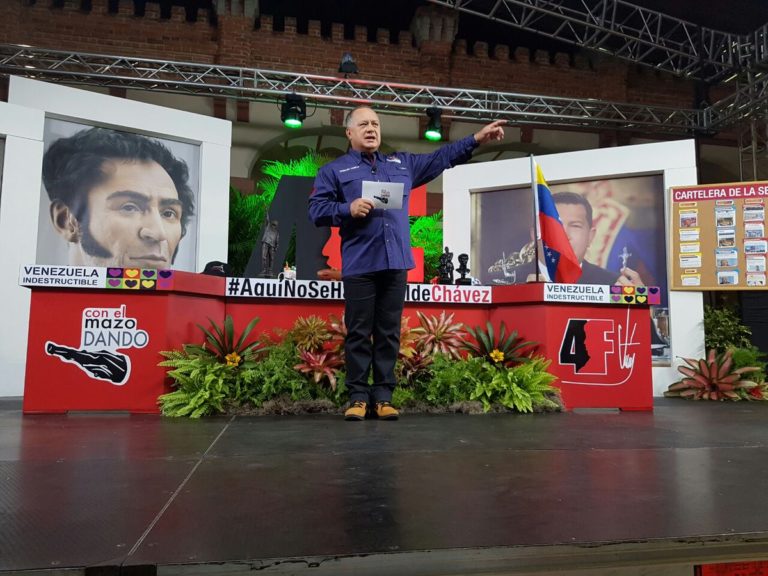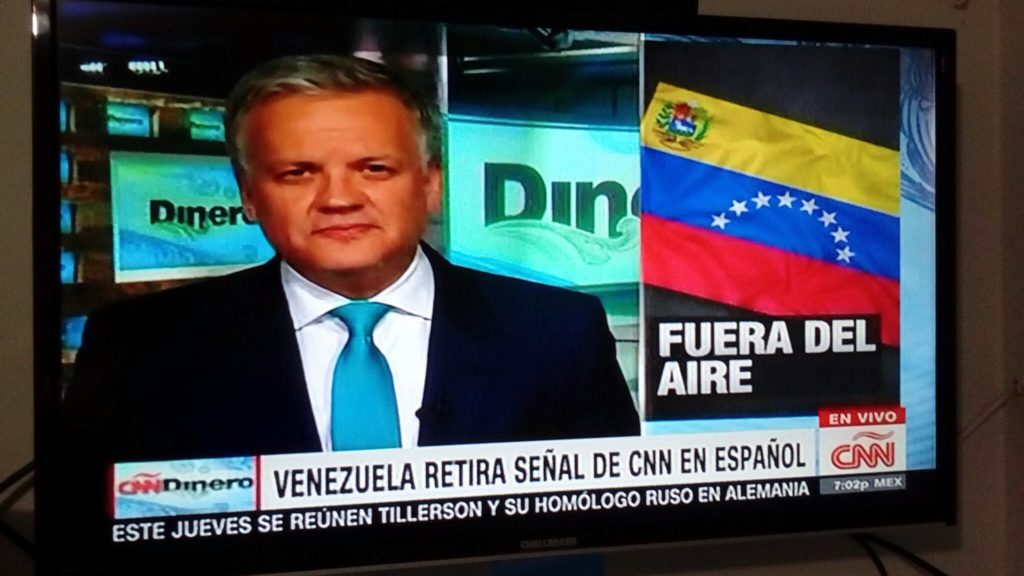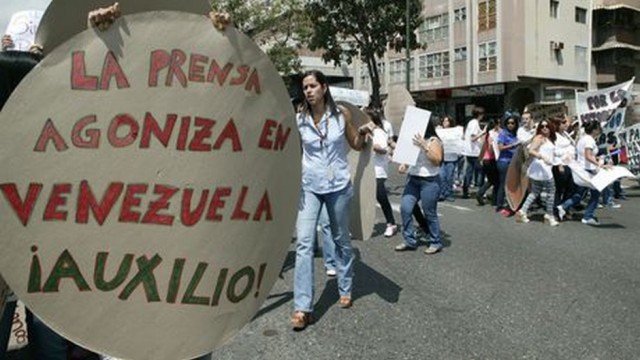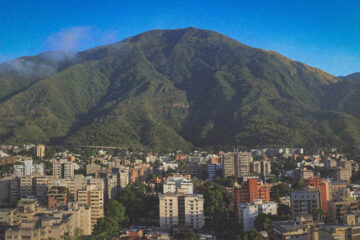I remember, twenty-something years ago, back when I was a but a mere child fascinated with shows such as Power Rangers, Ninja Turtles, Spellbinder, and many other superheroes and sci-fi shenanigans; happily enjoying the wonders of my Niño Jesus-sponsored Super Nintendo console, when a certain newspaper used to publish a satirical complemental section every Sunday.
“El Camaleón” (The Chameleon) it was called, and it would often use crude adult humor and clever imagery to satirize and ridicule the politicians and events of that era. Humor, after all, is one of the things that characterizes us as Venezuelans. Even if at times we’re overly dependent on it to cope with the hardships of our day to day reality (all my jokes are cries for help). My parents enjoyed El Camaleón and wouldn’t miss it for anything.
Television shows would also follow suit, featuring a multitude of comedy and entertainment shows for all tastes, even parodies of famous movies were produced at the time. You could also find shows that taught children about our culture, our music, our history—to care for it and celebrate all of it with pride.
“Por estas calles” (On These Streets) was by far the most emblematic Venezuelan telenovela of the 90s. A timeless production that encapsulated many of the daily problems faced by our citizens, shedding the rose-pink romance tropes of more traditional stories.
From poverty, crime, drugs, the suffering of the children of that era, et al; as well as the growing corruption of the government during the last years of the fourth Venezuelan Republic. A work of fiction that was quite close to reality, hence why it resonated so well amongst our populace; many of the events depicted on it still very much apply to our current collapse.
I remember the “Reconstituyente”, a theatrical play at the turn of the millennia, which among other things parodied the, at the time, newly elected President Hugo Chavez, his nascent “Bolivarian Revolution”, and his friendly relationship with Fidel Castro. It also satirized his fervent desire to rewrite the 1969 constitution and to bring forth a “Fifth Republic.”
Fast forward to Anno Domini 2018. These days parodies and satire of that kind are inconceivable—impossible to do.
With the government’s metaphorical guns pointed at the media and at any form of artistic expression, no one in their right mind will dare ridicule or criticize them in that way anymore, lest they risk hefty fines, the closure of said media outlet, or even worse, prison.
The Socialist regime’s shackles and gags do not apply to satire only, it applies to all forms of public communication and expression in this country.
If a TV or Radio host respectfully give their honest opinion on a recent incident of public interest, and some government honcho got bootyblasted by it? You can expect that person to be fired in a matter of hours—or even minutes if they receive a quick phone call from the People’s Ministry for Communication and Information CONATEL office.
A guest says something barely controversial with regards to the government? Expect that person to not be invited on that show ever again.
Some journalists publish an investigative report that implicates someone’s buddy in some shady business, with enough evidence to support everything that is being claimed? Expect them to be doxed and harassed, ultimately being forced to flee the country.
“Freedom of Speech” is a sacrosanct right that is engraved in the very soul of our current constitution, but it has slowly been conditioned out of daily life and shackled over the years; little by little it has been eroded and chipped away into a grotesque farce.
The government’s censorship has continuously acted like an entropic parasite, consuming our freedom of speech until only a husk of what it should be remains, all whilst keeping an innocent visage, especially towards the international community. Their use of legal technicalities to subdue private media outlets has become one of their specialties.
Hundreds of media outlets have been closed over the past two decades, from TV channels, newspapers, and radio stations—even websites have been forcefully shutdown or have had their access blocked from within the country for the sole crime of informing uncomfortable truths.
Several of the remaining outlets in Venezuela have been bought partially or wholly by people close to the government, and thus, have adopted a pro-government or a moderate stance in their content. Others have opted to self-censor themselves in order to survive through some twisted non-aggression pact.
Looking back at what we had versus what we currently have, I can’t help but feel gloom and sorrow at that precious thing that we slowly lost over the course of these past two decades: the ability to freely speak our mind within the confines of this country.
The Government’s media machine
The Venezuelan government has spent an astounding amount of public resources in creating a well-oiled and massive media behemoth: The “Sistema Bolivariano de Comunicación e Información” or SiBCI (Bolivarian System for Communication and Information), a grotesque hydra that spews their version of the ‘truth’ across all possible forms of communication.
“Officially” its comprised of three national broadcast television channels (VTV, TVES, ViVe), a Local broadcast TV channel (Avila TV), the International news channel TeleSUR; Over a dozen radio stations (not counting the community radios under their direct financing), and close to ten newspapers, some of which are region-based.
Of course, this does not include the multitude of media outlets that have been bought either partially or totally by people close to the government, and smaller groups such as those in charge of social media shills/bots, “communicational guerrillas” style of groups and whatnot, there’s even TV channels and radio stations operated by the military now.
There is no longer a separation between the public media—which should be at the service of every citizen—and the ruling Socialist Party’s propaganda machine, it’s all one and the same, the Socialist Party’s events and rallies are broadcasted, even those that are disguised under the pretense of an “official government act”.
It is a nonstop 24/7 propaganda machine that often portrays a different Venezuela, a Narnia or Wonderland-esque country devoid of hunger, where there’s no apparent medicine shortage, no bread lines, nada; where everyone’s happy attending those mandatory political rallies clad in red attires, in short, a Nation “where nothing can possib-lie go wrong” but everything that is actually going wrong isn’t their fault, ever.
The “Worker-President, driver of victories” is constantly praised, his figure elevated through a series of well-funded campaigns and news broadcasts. The Supreme Commander, years after his passing, is ever so present in the public media, his works and memories are the subject of matter of some shows, his old TV program, “Alo Presidente” is often rerun, his quotes and teachings are often used to explain recent government choices like the Petro cryptocurrency as if it were Biblical passages.
The opposition is mocked, ridiculed, bullied even (sure, at this point the entire MUD deserves to be bullied, but that’s beside the point), their private conversations are often leaked and broadcasted on live TV; phone-tapping is perfectly legal here—as long as it benefits the government.
The “Cadenas”
Imagine coming from home after one of those days, you know, those days, you had to spent two hours in a ATM line to get your daily Bs.10,000, something happened during your subway travel that made you arrive late for work, your boss wasn’t in the best mood and was angry all day for some reason, your office’s coffee had no sugar and was kinda bitter, the debit point of sale machine was working very slow at that bread line and they only sold two baguettes per person and one was half-burnt.
But its ok, you’re back home now, safe and sound, thank God! It’s time to watch that favorite tv show of yours, or perhaps tune in to that heated baseball match that just tied in one of the greatest comebacks this season when suddenly you see and hear this:
Media error: Format(s) not supported or source(s) not found
Download File: https://www.ckaleb.com/wp-content/uploads/2018/02/cadena-intro.mp4?_=1That my friend, is the announcement that a Cadena is about to begin.
A “Cadena” is a mandatory tv and radio government joint broadcast, it should be primarily used for emergency purposes, or to inform matters of the upmost importance to the populace.
But nope, not here; they’re often grossly abused to spew political narratives, to show the President’s meeting with his cabinet or the military, or even to show complete political rallies and speeches. They can often go for hours and hours; at times a “Noticiero de la Patria” (Newcast of the Fatherland) is often aired via Cadenas to exalt and praise the government whenever possible.
TV channels and Radio stations have no choice but to comply with the law and join in the broadcast, this often causes them hefty losses in advertisement revenue and unaired programming that they simply have to suck up.
What’s that, you don’t have cable TV? ggwp.
The Laws
As if having a massive media array and the ability to enact mandatory joint broadcasts at will wasn’t enough, several laws have been enacted by the government that have “regulated” the media for “The benefit of the people”, further hindering freedom of speech itself.
The “Resorte” Law
The Law on Social Responsibility on Radio and Television (Ley de Responsabilidad Social en Radio y Televisión) was passed in 2004 amidst highly criticism from the opposition and media, I remember the “gag law” moniker many media outlets and politicians used to nickname the project.
A simple glance at the law’s content would make it seem harmless, and rather beneficial for the consumers, with phrases like: “Respect for freedom of expression and information without censorship”; “Exercise and respect for human rights”; “The broadcasting of information and materials intended for minors”; “The broadcasting of national productions and encouraging the development of the national audiovisual industry”; “The dissemination of the values of the Venezuelan culture and furthering public participation.”
The law imposed absurdly detailed content ratings, mandatory quotas for independent and national productions oh both tv and radio. It also gave the government the right to impose the broadcast of public messages to all private operators, at least one minute per every hour of transmission.
News broadcast were hindered by the regulatory ratings of the law, preventing some types of news and live content, such as protests, from being broadcasted in its entirely due to the “supervised hours” schedules.
The “Anti-hate speech” Law
In November 2017, the all-powerful Constituent Assembly passed down the Constitutional Law Against Hate, for the Peaceful Connivance and Tolerance. (Ley Constitucional Contra el Odio, por la Convivencia Pacífica y la Tolerancia)
The Law stablishes very harsh prison times (up to twenty years) for anyone who spreads “hateful messages”, the ambiguity of what constitutes “hate speech” these days and the fact that there is no legal framework that clearly defines it is what makes it so dangerous.
Even messages posted on social media and any website are subject to it; if the “hateful” message isn’t deleted within six hours of posting, the government can permanently block access to that website.
Take for instance many of those verified twitter accounts that openly mock and insult Donald Trump or any other Politician. Some of those tweets would easily be the basis for up to 20 years prison here due to them being “hateful messages”.
The first case of arrests under this law took place in January 2018, when two citizens were arrested amidst a protest. Then, two priests were accused of “spreading hate”, with two more being under investigation as of last week.
Now you know why I don’t name them directly at times on twitter dot com, one day perhaps, when I’m on another country.
The Venezuelan Private Media
The Private media, once openly defiant of Hugo Chavez’s regime, has now been reduced to a shattered husk that struggles to survive in an ever growing sea of hardships. They’ve had to adapt and scale down in many aspects in order to continue to stay afloat in some form.Over the past twenty years, hundreds of media outlets, from TV channels to Radio to press have been shut down, at least 69 media outlets were shutdown in 2017 alone.
When political tensions hit a critical point in late 2001/Early 2002, most—if not all private national TV channels, radio, and newspapers adopted an open and defiant position against President Hugo Chavez, going as far as to collaborate in the failed coup attempt of April 2002.
At that time the government counted with way less media presence as it does nowadays, this was around the time they realized their glaring weakness in that field and decided to turn the tide and tighten the grip in their favor.
Television
During the tragic events of the April 11, 2002 coup. Hugo Chavez enacted one Cadena to address the Nation while all chaos continued to break loose in Caracas, people had no access to what was transpiring, no social media or smartphones existed back then, Internet wasn’t as widespread as it is nowadays.
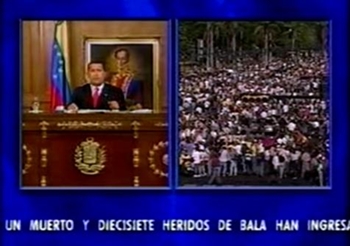
TV channels defied the mandatory Cadena broadcast by splitting the transmission in two halves, one showed the protests and events transpiring while the other half showed the President as he addressed the Nation. This action was not well received by the government, who hours later shut down a few TV channels in response.
After the failed coup attempt and the 2002 Oil Strike was over, a period of negotiations between the Government and the Oppisiton took place, during which few media outlets (Venevision just to name one the biggest cases) took a more “neutral” stance, a practice that they’ve continued to maintain even today, they were branded as “collaborationists” and “sellouts” as a result.
For the next five years, RCTV, the number one TV channel in Venezuela, continued its anti-goverment stance; Globovision, a news-focused TV channel in Venezuela, continued to be vocally critical of the Government. This went on until the government found its most elegant solution to get rid of their RCTV problem and make an example of them.
RCTV’s broadcast concession was renewed for twenty years in 1987 and was set to expire on May 2007, the government announced in December 2006 that it would not renew their lease “to a channel that participated in the coup.”
During the first five months of 2008, the government reinforced their case’s arguments, citing the “low quality and lack of educational content” of RCTV’s programming as another reason, claiming absolute sovereignty in their decision while facing the international backlash that ensued.
In that sense, the Government announced that it would bring forth a new TV channel to fill the coveted Channel 2 slot; something better, a quality “social” type of television that would rival even the British Broadcasting Corporation itself.
Since RCTV “would no longer need them”, the government seized all of their antennas and broadcasting equipment, and thus, TVES was born, eleven years later, it still hasn’t delivered the “BBC-like” quality television that was promised and its merely just another insipid branch of the Government’s media machine. The goverment-owned channel is run by a former RCTV star that cried on live tv the night RCTV was shutdown, talk about top ten anime betrayals.
The government, always so clever with their half-truths, still claims to this day that they did not “close down” the RCTV, they merely “did not renew their lease”, a technical truth in all but intent.
They found in their ability to control who gets their concession renewed or not a new weapon to subjugate TV and Radio operators, no longer doing twenty-year renewals like previous governments had done, instead, they’ve kept them limited to three to five years per renewal; in many cases, they’ve delayed the renewal process on purpose in order to force them into a concession limbo.
For a brief period of time, RCTV continued to operate and broadcasted through cable companies as “RCTV International”, but the government’s harassment continued until the government sanctioned them in 2010 in yet another technicality.
Globovision was sold in 2013, with the new owners came a new moderate approach, many of its emblematic and popular shows were wiped away, including those more critical to the goverment; the change was not well-received by the general population, so they’ve taken a whole “look at us, we’re so balanced, both sides guys, both sides™” kind of image approach in recent times.
Cable Television
Cable TV remains as a window out of the heavily controlled and self-censored national TV grid, most foreign news channels do a better job informing about Venezuela than local Venezuelan channels to these days.
Cable has not been without its troubles, with the government freezing their rates in many opportunities, they’ve been thus forced to reduce their growth and severely limit their ability to obtain new subscribers due to the lack of supplies, staying afloat with what they have. Some lesser cable operators, such as Supercable, have had to rescind their contract with some channel providers, replacing them with cheaper and less popular alternatives.
Over the past four years, several foreign channels have been banned from airing in Venezuela, such as NTN24 (banned for showing the 2014 protests, even their website has been blocked here), CNN en Español (Banned in 2017 for airing a report that implicated the Vice-president in drug trafficking, passport trafficking, etc. They’re now offering a livestream for Venezuela), Caracol, RCN, just to name a few.
It is worth mentioning that sometime between 2007-2009, the government wanted cable operators such as DirecTV Venezuela, Intercable, and Supercable to broadcast Cadenas on-top of their entire foreign channel grid, which would then violate the contract between said cable operators and every respective channel company.
A truce was achieved, however, cable companies that do not have at least 60% of international programming have to air the Cadenas, but this is a very minor case, if at all these days.
Radio
Just as with television channels, the government has used the renewal or refusal to renewal concessions as a way to shut down radio stations at will, replacing them with dummy stations operated by people close to the government, 46 radio stations were shutdown in 2017.
A recent example was 92.9FM, a youth-oriented radio station owned and operated by the same parent company that owned RCTV (1BC), in a repeat of history, their concession was kept in a limbo status and then suddenly not renewed, 92.9FM was shut down on August 2017, it was then replaced by a radio station that airs Venezuelan Llaneras, ran by someone once close to Hugo Chavez, again, just to fill the blank space left by its closure.
Press
In 2017 alone, approximately twenty newspapers had to stop circulating; the government controls the import of the paper material they need to print and release their newspapers, by limiting (and sometimes outright denying them) the amount they receive, newspapers have been forced to reduce the amount of pages in their issues, thus reducing the amount of information they can publish.
More than a handful of newspapers have had to migrate into the internet in order to keep working to some degree at their complete lack of materials. A few years ago, a newspaper called 6to Poder (6th Power) had their director arrested for publishing a cover that depicted a photoshopped image of the “Powerful women in the Government” in a Moulin Rouge cabaret-style montage
Internet and Social Media
Ah, our beloved internet access, one of the slowest in the world—and our last true way to inform and stay informed.
In 2010, the back then controlled by the government National Assembly wanted to reform the Resorte Law, and include regulations to the Internet much like they had done with the Resorte Law on TV and Radio.
As outrageous and outlandish as this might sound, they wanted to stablish “content hours” for the internet, much like those on TV or Radio, with one of their congressmen proudly claiming that they shouldn’t just regulate the Internet [Explorer], because there’s also “Mozilla” which only served to show the level of ignorance of those congressmen with regard to how Internet works.
He was then dubbed as the “Diputado Mozilla”, the Mozilla Congressman. Seriously, go search it up.
Hundreds of websites here have been blocked by the Government’s orders, with many of them being news websites such as Infobae, NTN24, Maduradas; some of these blocks can be easily bypassed by using alternate DNS services like OpenDNS and Google Public DNS, but others require the use of a proxy or VPN to access.
Dolartoday, the most used website for black market exchange rate references (and super clickbaity copypasted news articles), has been playing a nonstop cat and mouse game with the Government over the past eight years in order to circumvent their ban on this country.
During protest and election times, websites are purportedly throttled by the government, from youtube to twitter to news websites; this is done in order to turtle down access to information. During the 2014 protests, Zello, a relatively not known voice chat application, was banned because it was being used by the protestors, the app started to bypass the blocks with rapid updates, the government went as far as to throttle the entire traffic from all app stores so as to limit its reach.
The goverment was so busy censoring and stomping over traditional forms of media over the past decade that it had neglected the reach social media like Facebook and Twitter have amassed on our populace. Social Media rapidly become the premier source of information and communication for Venezuelans, with a huge surge taking place from 2010 onwards; which in turn made the government so adamant in their attempts to control its access and usage, as well as thwarting Internet anonimity as much as possible without going full Egypt/Iran/Turkey/et al.
And thus began the goverment’s efforts to stablish “trenches in that new field of the communications war”. They’ve invested thousands of dollars in setting up a massive array of bots that push their hashtag campaigns all day every day; they’ve also funded entire centers and groups of people dedicated to push and spread the goverment’s gospel and stories.
Más de 300 cuentas del SAIME y 400 del SAREN conforman la #tropa del régimen. Aquí vemos algunas a las órdenes de #ReverolSeguridadYPaz pic.twitter.com/ZEDhGvKHWz
— Jose Blanco Oliver (@jbo) June 7, 2017
Part of their narrative is that “Twitter Venezuela” actively engages in activities that squander the truth about the goverment, thus they’re merely engaging in warfare against these Imperialistic forces.
Recently, in another flagrant exercise of their draconian control, workers of the state oil company PDVSA were forbidden from following accounts on their social media websites aside from those in their officially approved list because this “Endangers the security and operational stability of the company.”
PDVSA officially forbids its employees to engage in the open social media, threatening with disciplinary sanctions or termination. pic.twitter.com/GoioHq0cAL
— Alejandro Machado (@alegw) February 21, 2018
The hacking of social media accounts of opposition figures, journalists, and other personalities that critizice the goverment is a common reccurence. Again, the goverment will have absolute deniability on this, just like they do when they tap into private phone communications.
The “Anti Hate Speech” law plays a large role on their efforts to supress free speech in social media, afterall, it was ultimately conceived as an instrument hinder dissenting comments on the Internet.
My only regret is that we’ll never see Hugo Chavez and Donald Trump shitpost at each other on twitter dot com, that would’ve at least been entertaining.
I hope this brief overview gives you a small glimpse as to how are things here right now when it comes to censorship and freedom of speech; cherish it, celebrate it, and defend it for us who have lost most of it.
As usual, comments and criticism are always welcome.
-Kal
(Thanks to Josh Bray for helping me with editing.)
